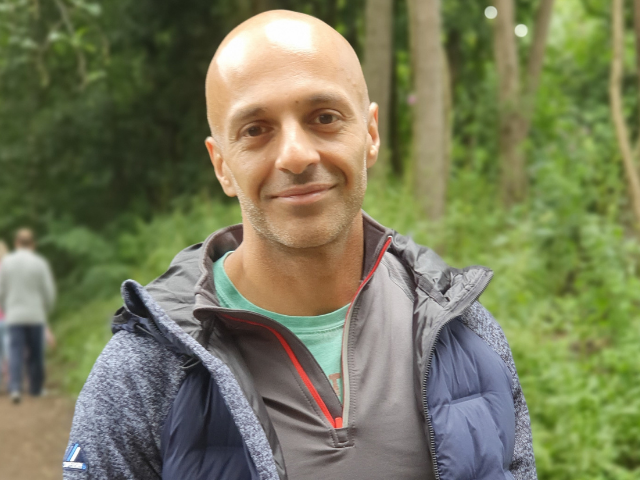
Meet the Rhondda Valley GP fighting antibiotic resistance with health data
Dr Harry Ahmed, 41, is both a GP and a researcher. When he’s not treating patients at Rhondda Valley Urgent Care Centre, he’s a Senior Clinical Lecturer at Cardiff University, and co-leads infections and antimicrobial resistance research at PRIME Centre Wales.
Harry has received a Health and Care Research Wales/National Institute for Health and Care Research (NIHR) Advanced Fellowship for his research analysing health record data to support safer prescribing of antibiotics. He lives in Cardiff with his wife and two children.
Something different every day
“What I enjoy about being a GP is you do something different every day and there’s scope to work in lots of areas, like research. I’ve recently been working on the PANORAMIC trial looking into a new COVID-19 antiviral treatment that people can take at home. I lead a team of GPs who are phoning patients to keep track of how they are feeling on the antiviral medication. The great thing about this trial is that patients don’t even need to come to hospital to take part in pioneering research as it all happens from home.
“My interest in research was sparked during my GP training at Prince Charles Hospital in Merthyr Tydfil. The hospital was testing new diabetes medication and this highlighted that research is key to finding better ways of caring for patients. I decided I wanted to combine my GP training with some research training and I have continued to do both GP work and research ever since.”
Major challenges
“I’m currently researching how we prescribe antibiotics. Antibiotic resistance is a huge problem and is posing major challenges. We need to find new ways of treating infections whilst also preserving the antibiotics we have left. GPs play an important role in this as most people with symptoms of an infection see their GP first, and about 75% of all antibiotics are prescribed by GPs. We need better diagnostic tests and a better understanding of the benefits and harms of different antibiotics.
“My research is different to the clinical trials that the public might be used to hearing about during the pandemic because it mainly involves analysing large, anonymous health data. A recent project is looking at whether patients with urine infections in Wales go on to have heart attacks. We know that infections like flu can put a huge strain on the body and in some patients, it can trigger a heart attack or a stroke, but we don’t know if the same is true for urine infections.
"Alongside some fantastic colleagues from Cardiff and Swansea, we’re using health record data from SAIL Databank, which is funded by Health and Care Research Wales, to find out the answer. We will look at lab data, which tells us if a patient had an infection, and then at hospital data to see if that patient is then admitted with a heart attack.”
The best part of my job
“The mix of clinical work and research is the best part of my job. I’m able to see patients, talk through their problems, and ask them what research would be important to them. Patients often ask questions that make me think about whether more research is needed. For example, people often want to know what the best treatment is, or how likely a particular side effect is, or what a new diagnosis means for them.
"Answers to these questions are not always clear and helping patients to find answers often leads to new research ideas. The idea for my first study came from an older patient who had several urine infections which were treated with antibiotics and who then developed an antibiotic resistant infection.
“Health data helps us to answer questions relevant to the population of Wales. In my first research study, I used data from over a million people. This data allows us to answer vital questions about health and social care without people having to travel far or volunteering their time to take part. They’ve shared their data safely and anonymously, which helps us to improve how we care for them and their loved ones in the future.”
Find out more about the people behind the research and how Welsh research has changed lives
To get the latest research news in Wales straight to your inbox, sign up for our weekly bulletin